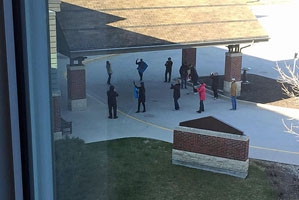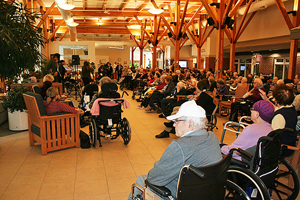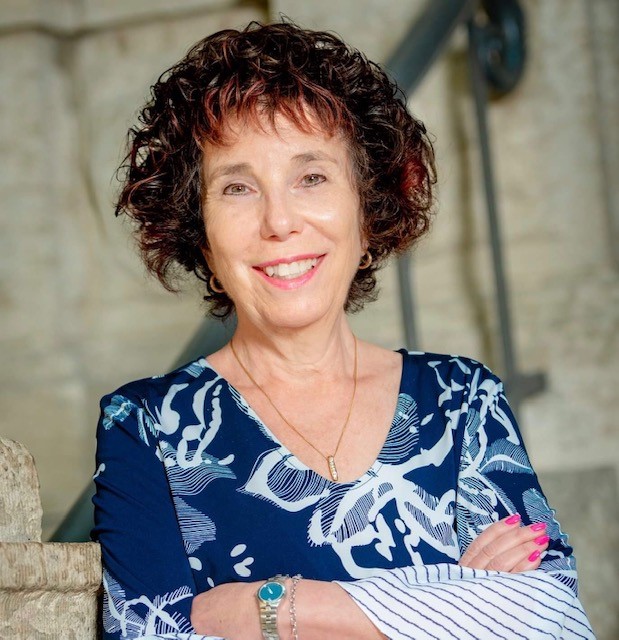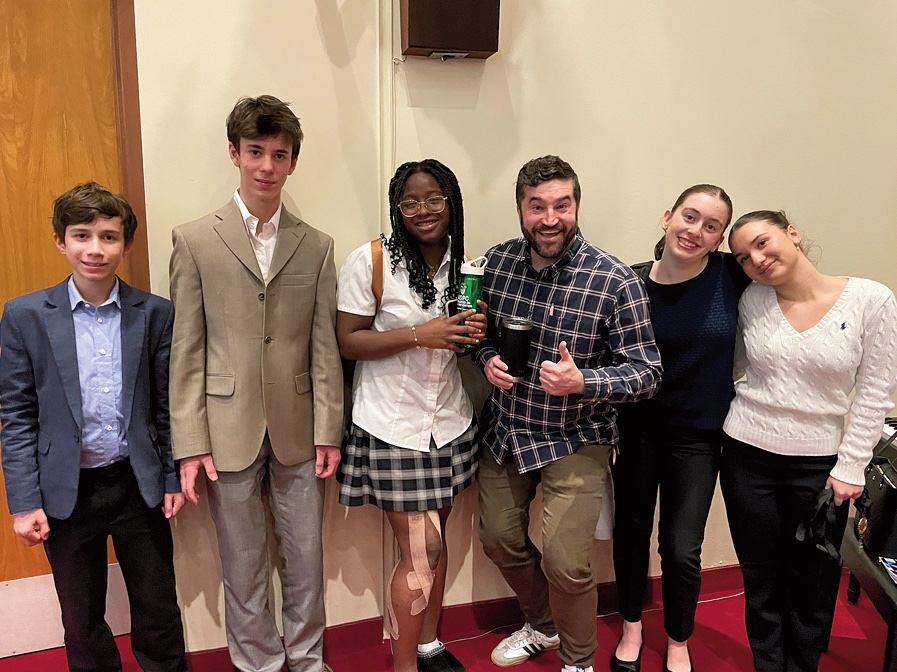Local News
Simkin Centre staff have been doing a fabulous job dealing with the demands placed on them by COVID-19

By BERNIE BELLAN
The role that Personal Care Homes have been playing in the COVID-19 pandemic is a crucial one.
We’ve all heard about the horror stories associated with seniors’ homes in other jurisdictions – especially Quebec, so it’s natural for anyone in Manitoba who has a loved one in a PCH to be especially concerned about the heightened risks associated with those facilities.
Whether it’s good luck or good management – or a combination of the two, we seem to have been spared any serious outbreaks in PCH’s in Manitoba – and none at all in the Simkin Centre.
In our April 15 issue, I reported on some steps that Laurie Cerqueti, CEO of the Simkin Centre, had said were being taken at the Centre in response to what has already begun to emerge as a pandemic here in Manitoba, along with the rest of the country. That article noted that:
“The front entrance is now the only entryway for staff into the building so that we can ensure full screening of everyone entering the building.
“20 extra bedside tables have been ordered to assist with social distancing during resident meal times.
“All vendor supplies are now dropped off only at the receiving entrance and are not being brought into the building as was normally done prior to this.
“A system has been developed for Resident supplies being brought by family. They are now left on a table in the vestibule and items are being wiped down with an antiviral wipe prior to being distributed to the care areas.
“Dr. Koven, our Medical Director, is now the only MD that will be onsite to assess Residents. He does not attend other sites at this time so is less likely to bring COVID-19 into our building. Other MDs will respond to phone calls from nursing and do virtual visits as able.
“Over 95% of all staff have now been trained in feeding and swallowing so that we can all help to ensure that are Residents are being fed. Currently, about 52% of our Residents require assistance with meals. Helping Residents with meals has brought joy and new purpose to staff that would not have previously been involved in Resident care.
“We have prepared for the eventuality that many staff and managers may be living at the Centre. We have ordered extra mattresses for staff to sleep on, purchased toiletries for staff, and purchased portable cell phone chargers.”
On Thursday, May 6, I spoke with Laurie and with Aviva Tabac, Fundraising and Administrative Officer at the Simkin Centre, to find out how things have gone for the 200 residents and 250 staff at the Simkin Centre since that April 15 report.
Laurie Cerqueti began the conversation by saying: “We’re actually doing quite well in many ways and staff have gone above and beyond to do things, to make sure the residents are cared for and fed. We’ve seen a lot of good come out of this.”
I said to Laurie that a recent story in the news about how resident Shirley Kleiman receives visits every day from her husband, Sam, who comes to a window to say hi – and tell her how much he loves her, must have resonated with anyone who saw that story. I wondered how many residents are actually able to be brought to windows to see loved ones?
“Not all residents would go and do the window visits with family,” Laurie answered, “but all of the rooms have windows and all of the windows open so they can get fresh air, but we do the window visits in the atrium area. There are also families that will go to a particular resident’s room and connect there (using cell phones). Anyone on the main floor would have the opportunity to do that.”
I wondered whether the issue of putting cameras into residents’ rooms had come up (stemming from the shocking lack of supervision in certain Quebec nursing homes).
Laurie said: “You mean the ‘nanny cams’? No, we haven’t had that requested, and I think families know we’re doing the best we can – with the Facetiming, Skype or Zoom. Aviva does a Zoom call with a resident here and there have been up to 12 family members participating in that Zoom session.”
Laurie went on to explain that an iPad is brought into residents’ rooms – one at a time, for those interactive sessions, which are all prearranged. “We’ve actually just launched an online booking system for those types of visits,” she explained (including window visits) at www.simkincentre.ca.
I referred to our April 15 article, which referred to staff preparing to sleep over at the centre, if necessary. Although that hasn’t proved necessary, according to what Laurie told me, I wondered about the state of morale among staff in general, considering the extreme stress under which they must be working.
“Actually, I think we have a very high morale now,” Laurie said. “Everybody’s working together – probably better than they ever have been, including a lot of us that wouldn’t typically help with assisting residents with meals. We’re all chipping in to make things work.
“That doesn’t mean that staff aren’t scared,” Laurie added, however. “I think everyone’s a little bit scared, including me and you, Bernie”.
“Yah,” I said, “but I think the level of apprehension must be lower than when the virus first emerged in Manitoba because we seem to have escaped the brunt of it here.”
Have there been any Personal Care Homes in Manitoba that have seen the virus show up, I wondered?
“Yes, there have been,” Laurie responded, “but all sites went into a lockdown some time ago.” She noted that “all staff are required to wear face masks and goggles; staff are screened every time they come to work; we take their temperature; we ask them a series of questions. It would probably be safer here than when you go to the grocery store.
“The other thing we do,” Laurie continued, “is every week we try and show our appreciation for staff so some board members and family members have donated funds, treats or products to help make this happen.”
I wondered about programming for residents – and to what extent there are still programs available?
“All of the programs in the atrium and the multi-purpose room have been canceled,” Laurie answered. “Recreation programming happens on the individual units now or out in the courtyard, where we’re able to physically distance residents one from another. And, any new admissions we would have isolate in their room up to 14 days. Otherwise residents are out and about in their individual units. There are a few residents that are able to make it to the atrium on their own, but there aren’t large groups of them together.”
“What about meals?” I wondered. “Are meals being taken in the residents’ rooms or are they still able to go to the common areas in the units?”
“They are able to go to the common area,” Laurie explained, “but we spread it out so we have ordered extra bedside tables so it’s not as tight as it would normally be where we’d have three to four residents at a table.”
 I asked Aviva what else the Simkin Centre has been doing for residents as far as being able to make the time pass under these stressful circumstances?
I asked Aviva what else the Simkin Centre has been doing for residents as far as being able to make the time pass under these stressful circumstances?
“The recreation department has stepped up in a huge way,” she began. “They’re running smaller programs on the units now. They have programs that run in the morning and the afternoon. Now, we also have evening and weekend staff that are doing recreation.
“And, even though Steven Hyman (who regularly conducts Shabbat and holiday services at the centre for residents and families) is not able to be here in person, he has been recording videos of services that we show to residents.”
Laurie noted, as well, that “we are having services on the units every Saturday.”
Aviva continued: “The residents are pretty busy. They’re doing art programs, they’re doing bingo, exercise programs…we’ve had musical entertainment.”
“We’ve actually had musicians come to our courtyard,” Laurie noted, “where they play and we open the windows so that the residents can hear the music and see the musicians.”
“What about the financial situation for the Simkin Centre?” I wondered. “How different is it as a result of the pandemic?”
“There are a number of large costs for equipment and supplies – right when it started happening,” Laurie answered, “and there are ongoing costs.”
“And you mean Simkin will have to assume responsibility for those costs – and not the province?” I asked.
“I’m not confident that the province will fund partially or fully any of this,” Laurie said.
“Really – wow!” I said. “You mean it’s all going to fall on to the Personal Care Homes themselves to fund?”
“It could,” Laurie said. “I’m not confident” (that the province will provide the funding).
She added that, in addition to the extra costs imposed on PCH’s for equipment and supplies, “there are all these new rules – if you’ve traveled, you can’t come to work for 14 days; if you have any symptoms you have to go get swabbed, and then you have to have the A-OK, you can come back to work; or people that have pre-existing conditions aren’t able to work. So there are increased staffing costs that we are incurring.”
“Have you had a lot of staff who have been affected by all these new rules?” I asked.
“There would have been, especially in March, which was peak travel season” for a lot of people, “including our staff,” Laurie said.
“We are staying close to the community and I think people are appreciative of the work we’ve been doing here,” Laurie said in conclusion.
Local News
Cheryl Hirsch Katz, Jewish Child and Family Service’s longest serving staffer, set to retire at end of the month

By MYRON LOVE “I loved working at Jewish Child and Family Service,” says Cheryl Hirsh Katz, who is due to retire at the end of June. “I have always appreciated the warm and welcoming atmosphere here. I feel that the people working here are my extended family. I am going to miss my colleagues”.
“I have derived great satisfaction over the years to have been able to help many people in our community of all ages through my work at JCFS,” she continues.
After 44 years at the agency, Katz, the longest-serving member of the staff, was given an appreciative send-off at the JCFS’s recent (June 23) Annual General Meeting at the Shaarey Zedek Synagogue.
The daughter of Art and Bess Hirsh, Cheryl grew up in Garden City. She attended Peretz School, then Jefferson Junior High and Garden City Collegiate. She joined the staff of JCFS in 1981, shortly after receiving her Bachelor of Social Work degree.
She earned an MSW in 1990.
“I chose to become a social worker,” she recalls, “because I always wanted to be able to help people.”
Katz was originally hired by JCFS to work with newcomers. After a couple of years, she was given responsibility for looking after the needs of older adults.
“I really enjoyed working in older adult services,” she says. “That is where I spent the bulk of my time at JCFS.”
After ten years as a case worker, she was promoted to a supervisory role. Later, she was also given responsibility for mental health and addictions programming and settlement services, while keeping the older adult files under her purview.
“As a supervisor, I wasn’t directly involved with individual clients,” she points out. “I was more involved with programming. Among the programs for seniors we organized were – for example – sessions on elder abuse, digital storytelling and memory loss.”
She notes that one of the trends she has seen over the last 44 years is that people are living longer and living in their homes longer. A lot more of our clients are living well into their 90s,” she observes. “We have had to continually expand our staff and the services we provide in order to accommodate the growing demands of an aging population.”
She also spoke of the mental health needs of seniors and aging Holocaust survivors.
She says that she has mixed feelings about leaving JCFS. “After so many years working full time, I am going to have to create a new routine,” she comments.
She notes that, now that she is retired, she will have more time to spend with her parents – who are in their 90s.
And then, there are the two dogs to look after. “I will have time now to try new activities,” she says. “ I might learn to play mah-jong.”
She speaks about maybe doing some traveling – although her husband, Murray, is still working full time.
(She and Murray have one daughter, Farah.)
“Retirement may also include some volunteering,” she adds.
It is quite likely, she will be continuing her association with JCFS but in a volunteer capacity.
Local News
Gray Academy students shine in provincial, national debating competitions

By MYRON LOVE It has been another good year for Gray Academy’s high school students who participated in provincial and national debating competitions. The best results were recorded by Grade 9 student Noa Mednikov, who finished fourth overall nationally, fourth in interpretive reading, and fifth in persuasive speaking at the junior National Public Speaking Championship in early May in Vancouver.
Last October, in the Junior Provincial British Parliamentary Championship – which was held at St. John’s-Ravenscourt – Noa and her partner, Raya Braunstein, finished third as a team while Raya placed third in individual debating.
Their fellow Grade 9 student Maxim Moscalenkov tied for first in persuasive speaking in Vancouver, while the Gray Academy team of Gabe Tapper and Aaron Koplovich finished fifth. Aaron also finished fifth in his individual debate.
Earlier, in March, Maxim finished fifth in the Provincial Juniors debating competition, which was held at Balmoral Hall He and his debate partner, Nate Shenkarow, finished seventh among the teams entered. Last November, he and partner, Ethan Tenenbein, finished seventh in the Junior Prepared Tournament – just behind the Gray Academy team of Nate Shenkarow and Jack Kay.
At the senior high level in that competition, the team of Jacob Tenenbein and Jonah Novoseller finished fourth and Jacob was recognized as fifth best in an individual capacity. Jonah and Jacob also paired up to win the Asper Cup, which was held at their home school.
Jacob represented Manitoba at the Junior National Speech Championship in Vancouver in May and, last October, he and Grade 12 Gray Academy students Julie Krozkin and Daniel Bokser represented Canada at an international debating tournament in Bermuda.
Gray Academy’s debating program was introduced by Linda Martin in 2003. She also led the debating teams at Balmoral Hall. In 2011, Martin was succeeded by Gray Academy high school English teacher Andrew Kaplan.
“Andrew has done a wonderful job with the debating program” says Martin, who has a debating trophy at Gray Academy named in her honour, as well as a provincial trophy for best individual junior debater. “Over the years, Gray Academy students have done very well in many local, national and international competitions,” she adds.
About three weeks ago, this writer had the opportunity to sit down with Andrew Kaplan and six of the school’s top debaters while they discussed the benefits of learning how to debate. According to Noah Strauss – who competed in the Junior Provincials at Balmoral Hall in March, public speaking leaves him with a feeling of accomplishment.
“It’s a good skill set to have,” he observes. “It builds confidence.”
“A benefit of being able to debate is that you learn how to convince people that you know what you are talking about,” adds Maxim Moscolenkov.
Raya Braunstein notes that being able to debate is a skill that she expects to be helpful in many university courses which she may choose to take.
As Andrew Kaplan notes, the ability to express yourself has a great impact in whatever career you choose to pursue.
He points out that debating is compulsory at Gray Academy for all Grade 7 and 8 students – and students can continue debating as an option in the higher grades
Of course, competitive debating is not for everyone. For those students who opt to take that path, the journey begins with internal school debate competition – with the top debating teams and individuals qualifying for local tournaments and – potentially – beyond.
Andrew Kaplan reports that a small number of high schools in Winnipeg and southern Manitoba have active debating programs – including St. Johns Ravenscourt, St. Paul’s High School, St. Mary’s Academy, Garden City and Maples Collegiates in the Seven Oaks School Division, St. Maurice (a Catholic School), as well as Morden Collegiate and Dasmesh, a Sikh private school.
Kaplan expresses his appreciation to the Asper Foundation and an endowment spearheaded by the Kives Family for providing funding for the Gray Academy debating program – as well as the Andrew Slough Foundation – which was established by his friends in memory of the outstanding former Ravenscourt student debater and lawyer who passed away suddenly two years ago at the still young age of 38.
I am confident that our Jewish community can look forward to the continued success of Gray Academy’s star debaters and to the continual emergence of future stars as the times goes by.
Local News
Antisemitism has crept into grade school in Canada

Antisemitism in Canada has moved beyond protests and politics; it is now entering classrooms and altering how Jewish children see themselves functioning within them.
A a university student I have observed the experience of my younger brother in grade eight as a Jewish student. Over the past few months, his school has been at the center of several deeply troubling incidents that have made him feel unsafe in our parks, community, and even his school. Swastikas were drawn around the community, in parks and ponds. Additionally, an older man, who claims to be a pro-Palestinian influencer, stood outside his predominantly Jewish school wearing a keffiyeh, filming a video which then circulated between students on TikTok.
This same man later showed up to our local Jewish community center in keffiyeh to allegedly watch his son play basketball where my brother and many of his classmates go for their lessons, basketball games, and Jewish events. These moments made him and his peers feel watched and targeted just for being Jewish. Local political representatives condemned the incidents and raised awareness about antisemitism, but the fear among students didn’t go away. The feeling of being targeted for simply existing has been taught to my brother, something my parents had tried their hardest to escape from.
Most recently, my brother was chosen to represent his school at a regional science fair. When one of the judges arrived wearing a keffiyeh, he froze. For many, including my brother after the incidents he has faced, the keffiyeh represents a political message. But even more so for my younger brother, it is tied to the fear and intimidation he had already experienced. He felt nervous, distracted, and unsure of how to act.
This is not about silencing political expression. It is about a child who came to share his ideas and left feeling uncertain and afraid. It is about the atmosphere forming in Canadian schools, where Jewish students are being made to feel targeted and unwelcome.
His school made an effort to address the incidents, but the impact is lasting. Posts on social media, much can be very vague at times about inclusion cannot fully undo the feeling of being singled out. A kind word from a teacher does not erase the fear that builds when threats are left unspoken but deeply felt.
I am writing this as a sister who watched her younger brother lose a moment that should have been filled with confidence and pride. He deserved to feel safe. So do all Jewish students in this country.
Moving forward, schools must take concrete steps to protect all students. Antisemitism cannot only be addressed when it becomes violent or overt. It must also be recognized when it appears as intimidation, symbolic targeting, or political messaging that creates fear among students. Children should never have to question whether they are safe in their own classrooms or community spaces.
Events that are meant to support and celebrate students must remain focused on them. Individuals who feel the need to bring political symbols or messages into school grounds or children’s events should not be welcomed in those spaces. Schools must make it clear that their environments exist to support learning, safety, and inclusion, not to host agendas that can intimidate or isolate students.
Administrators and educators must develop clear guidelines for identifying and responding to antisemitic behavior in all its forms. This includes strengthening security measures, offering ongoing staff training, and engaging directly with Jewish families to understand their concerns. Inclusion is not a one-time statement. It is a responsibility that must be reflected in everyday decisions and actions. No child should ever feel unsafe or unwelcome because of their identity.
The author is a Campus Media Fellow with HonestReporting Canada and Allied Voices for Israel who lives in Toronto.
